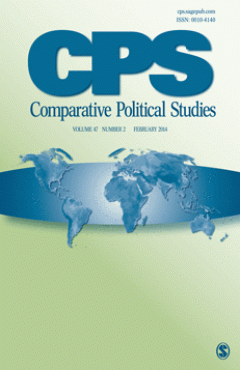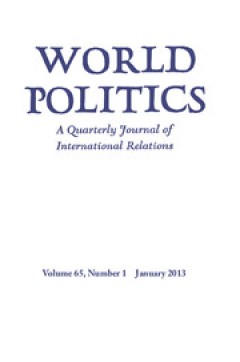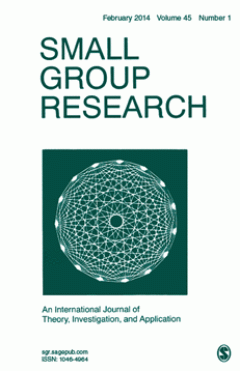Filter by

Policy dynamics and electoral uncertainty in the appointments process
By incorporating electoral uncertainty and policy dynamics into three two-period models of the appointments process, we show that gridlock may not always occur under divided government, contrary to the findings of static one-shot appointments models. In these cases, contrary to the ally principle familiar to students of bureaucratic politics, the president or the confirmer is willing to…
- Edition
- Volume 29, Issue 1, January 2017; pp. 124–148
- ISBN/ISSN
- 0951-6298
- Collation
- -
- Series Title
- Journal of Theoretical Politics
- Call Number
- -

Participation and boycott in authoritarian elections
The existence of authoritarian elections raises a number of questions regarding the strategies of political opposition. What explains the choice of strategy among key opponents of a regime? What determines when opposition groups willingly participate in elections and when they engage in electoral boycott? To understand the opposition�s strategic choices, we develop a formal model of gov…
- Edition
- Volume 29, Issue 1, January 2017; pp. 97–123
- ISBN/ISSN
- 0951-6298
- Collation
- -
- Series Title
- Journal of Theoretical Politics
- Call Number
- -

Working smart and hard? Agency effort, judicial review, and policy precision
The lion�s share of policy in the United States is made by administrative agencies. Agencies not only make policy choices, they must also implement policy effectively. Oversight institutions play an integral role in the policymaking process by monitoring, through review of agency policy actions, both policymaking tasks. Through analysis of a formal model I develop a theory of policymaking…
- Edition
- Volume 29, Issue 1, January 2017; pp. 69–96
- ISBN/ISSN
- 0951-6298
- Collation
- -
- Series Title
- Journal of Theoretical Politics
- Call Number
- -

Ideology signaling in electoral politics
This paper considers an electoral model in which an incumbent and a challenger have ideological policy preferences that are private information. The incumbent may bias pre-electoral policies to signal preferences to the electorate with the aim of affecting the outcome of the election. When the two candidates are of completely different types, such a policy bias can occur only in a moder…
- Edition
- Volume 29, Issue 1, January 2017; pp. 48–68
- ISBN/ISSN
- 0951-6298
- Collation
- -
- Series Title
- Journal of Theoretical Politics
- Call Number
- -

How uncertainty about judicial nominees can distort the confirmation process
Why are judicial nominees allowed to refuse to answer questions about important issues that could come before the courts? We address this question by examining the information environment surrounding judicial nominations. Using the Supreme Court as our example, we formulate a model that departs from the existing literature by incorporating the fact that the Senate often does not know what…
- Edition
- Volume 29, Issue 1, January 2017; pp. 22–47
- ISBN/ISSN
- 0951-6298
- Collation
- -
- Series Title
- Journal of Theoretical Politics
- Call Number
- -

May’s theorem in one dimension
This paper provides three versions of May�s theorem on majority rule, adapted to the one- dimensional model common in formal political modeling applications. The key contribution is that single peakedness of voter preferences allows us to drop May�s restrictive positive responsiveness axiom. The simplest statement of the result holds when voter preferences are single peaked and linear (n…
- Edition
- Volume 29, Issue 1, January 2017; pp. 3–21
- ISBN/ISSN
- 0951-6298
- Collation
- -
- Series Title
- Journal of Theoretical Politics
- Call Number
- -

Comparative Political Studies, Volume 50, Number 5, April 2017
- Edition
- -
- ISBN/ISSN
- 00104140
- Collation
- -
- Series Title
- -
- Call Number
- -
- Edition
- -
- ISBN/ISSN
- 00104140
- Collation
- -
- Series Title
- -
- Call Number
- -

Comparative Political Studies, Volume 50, Number 3, March 2017
- Edition
- -
- ISBN/ISSN
- 00104140
- Collation
- -
- Series Title
- -
- Call Number
- -
- Edition
- -
- ISBN/ISSN
- 00104140
- Collation
- -
- Series Title
- -
- Call Number
- -

Comparative Political Studies, Volume 50, Number 6, May 2017
- Edition
- -
- ISBN/ISSN
- 00104140
- Collation
- -
- Series Title
- -
- Call Number
- -
- Edition
- -
- ISBN/ISSN
- 00104140
- Collation
- -
- Series Title
- -
- Call Number
- -

Evaluation, Volume 23, Number 2, April 2017
- Edition
- -
- ISBN/ISSN
- 13563890
- Collation
- -
- Series Title
- -
- Call Number
- -
- Edition
- -
- ISBN/ISSN
- 13563890
- Collation
- -
- Series Title
- -
- Call Number
- -

Evaluation, Volume 23, Number 1, January 2017
- Edition
- -
- ISBN/ISSN
- 13563890
- Collation
- -
- Series Title
- -
- Call Number
- -
- Edition
- -
- ISBN/ISSN
- 13563890
- Collation
- -
- Series Title
- -
- Call Number
- -

Critical Social Policy, Volume 37, Number 1, February 2017
- Edition
- -
- ISBN/ISSN
- 02610183
- Collation
- -
- Series Title
- -
- Call Number
- -
- Edition
- -
- ISBN/ISSN
- 02610183
- Collation
- -
- Series Title
- -
- Call Number
- -

World Politics, Volume 69, Number 2, April 2017
- Edition
- -
- ISBN/ISSN
- 00438871
- Collation
- -
- Series Title
- -
- Call Number
- -
- Edition
- -
- ISBN/ISSN
- 00438871
- Collation
- -
- Series Title
- -
- Call Number
- -

World Politics, Volume 69, Number 1, January 2017
- Edition
- -
- ISBN/ISSN
- 00438871
- Collation
- -
- Series Title
- -
- Call Number
- -
- Edition
- -
- ISBN/ISSN
- 00438871
- Collation
- -
- Series Title
- -
- Call Number
- -

Small Group Research, Volume 48, Number 2, April 2017
- Edition
- -
- ISBN/ISSN
- 10464964
- Collation
- -
- Series Title
- -
- Call Number
- -
- Edition
- -
- ISBN/ISSN
- 10464964
- Collation
- -
- Series Title
- -
- Call Number
- -

Small Group Research, Volume 48, Number 1, February 2017
- Edition
- -
- ISBN/ISSN
- 10464964
- Collation
- -
- Series Title
- -
- Call Number
- -
- Edition
- -
- ISBN/ISSN
- 10464964
- Collation
- -
- Series Title
- -
- Call Number
- -

Journal of Theoretical Politics, Volume 29, Number 2, April 2017
- Edition
- -
- ISBN/ISSN
- 0951-6298
- Collation
- -
- Series Title
- -
- Call Number
- -
- Edition
- -
- ISBN/ISSN
- 0951-6298
- Collation
- -
- Series Title
- -
- Call Number
- -

Journal of Theoretical Politics, Volume 29, Issue 1, January 2017
- Edition
- -
- ISBN/ISSN
- 0951-6298
- Collation
- -
- Series Title
- -
- Call Number
- -
- Edition
- -
- ISBN/ISSN
- 0951-6298
- Collation
- -
- Series Title
- -
- Call Number
- -

Gender & Society, Volume 31, Issue 2, April 2017
- Edition
- -
- ISBN/ISSN
- 08912432
- Collation
- -
- Series Title
- -
- Call Number
- -
- Edition
- -
- ISBN/ISSN
- 08912432
- Collation
- -
- Series Title
- -
- Call Number
- -

Gender & Society, Volume 31, Issue 1, February 2017
- Edition
- -
- ISBN/ISSN
- 08912432
- Collation
- -
- Series Title
- -
- Call Number
- -
- Edition
- -
- ISBN/ISSN
- 08912432
- Collation
- -
- Series Title
- -
- Call Number
- -
 Computer Science, Information & General Works
Computer Science, Information & General Works  Philosophy & Psychology
Philosophy & Psychology  Religion
Religion  Social Sciences
Social Sciences  Language
Language  Pure Science
Pure Science  Applied Sciences
Applied Sciences  Art & Recreation
Art & Recreation  Literature
Literature  History & Geography
History & Geography